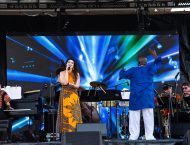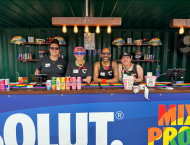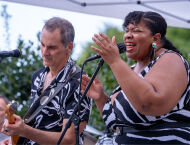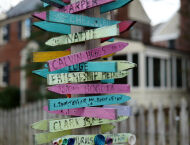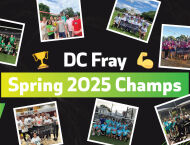Music
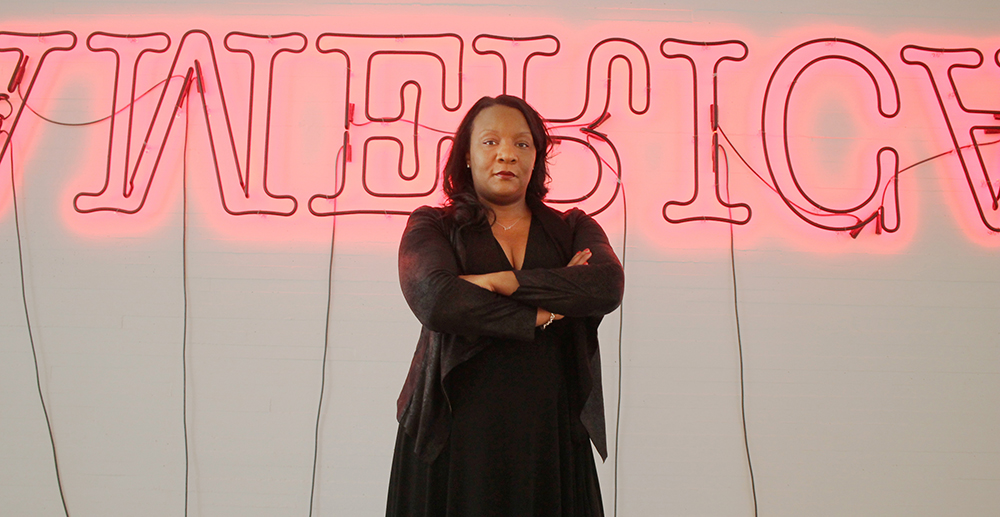 Photo: Trent Johnson
Photo: Trent Johnson
A Day in the Life with Simone Eccleston, the Kennedy Center’s Director of Hip Hop Culture and Contemporary Music
November 2, 2019 @ 12:00am
When you think of hip-hop venues in DC, it’s probably fair to say that the Kennedy Center isn’t the first that comes to mind – but perhaps this sentiment is beginning to shift. In recent years, the nationally renowned institution has made exceptionally large steps toward taking hip-hop more seriously as a conduit for culture, including several festivals and concerts featuring performances by legendary stalwart Nas and Pulitzer Prize winner Kendrick Lamar. In 2016, A Tribe Called Quest co-founder Q-Tip became the Kennedy Center’s first artistic director for hip hop culture, and less than a year later, the center announced the appointment of Simone Eccleston as its first-ever director of hip hop culture and contemporary music.
Since then, Eccleston has worked with Q-Tip and other members of the center’s hip hop culture council, which includes an impressive amount of star power and influence such as Questlove, LL Cool J, Big Boi, Common, MC Lyte and a score of others. Though Eccleston’s name may not evoke the same kind of awe from hip-hop heads as Q-Tip or Common, this doesn’t diminish her impact. Since taking on the mantle of director in this brand-new initiative, there’s undoubtedly been an uptick in programming investigating the cultural impacts of hip-hop, from workshops to film screenings and other intersectional events in-between. To learn more about her inaugural position at the helm of hip-hop culture, we spoke to Eccleston about her affinity for hip-hop, her ongoing mission and what she’s learned in the role.
On Tap: What are your earliest memories of hip-hop?
Simone Eccleston: The first song that I remember knowing word for word was LL cool J’s “Around The Way Girl.” I was age 10 at that point. There was something about the energy of the song and the video. It was fun and had an unapologetic New York vibe. I loved the way that it celebrated independent women and reminded me of women in my neighborhood. At 12, I heard Pete Rock and C.L. Smooth’s T.R.O.Y. and my whole world changed. It was so honest, vulnerable and familiar. I connected with it immediately. It’s still one of my favorite songs.
OT: Are there other artists who stuck out to you in your formative years?
SE: The artists that really helped me fall in love with hip-hop and see myself reflected early on were MC Lyte and Queen Latifah. They were both strong women with powerful lyrics. Their self-possession was inspiring. I remember seeing them and aspiring to be a woman of strength.
Five Things Simone Can’t Live Without
Prayer
Family
Purpose
Live music
A great DJ
OT: If you could’ve told that 10-year-old girl in the Bronx listening to LL Cool J, Queen Latifah and MC Lyte that in the future you’d be on the phone with these people, what would she have said?
SE: My 10-year-old self would bust out with The Running Man [Laughs]. I will say this: not necessarily when I was 10, but when I was 16 [to] 25 through now, there was a part of me that always knew I would be working in service of the culture. I knew my life’s work and purpose would be tied to celebrating the genius of people of color.
OT: Did you ever think you’d be in a role like this, focusing on the culture of hip-hop?
SE: I remember when [the Kennedy Center] announced their commitment to hip-hop culture as a program in 2016, in the back of my mind I was thinking, “I want to be there.” Who would have thought I would be the inaugural director, working with Q-Tip and our incredible council? They’re an incredible community that is so committed to being of service to the culture. They reflect the very best of who we are.
OT: Is it ever surreal for you to be working with some of the people you credit with your love of the genre?
SE: Yes, it can be surreal. But more than surreal, it’s incredibly humbling and gratifying. Being able to partner and collaborate with them to do this work is a gift and a blessing, and I don’t take it for granted. To be able to partner with someone like Q-Tip, who has deeply inspired my love of hip-hop and [A] Tribe [Called Quest] as a group – he’s such a visionary. He’s someone who’s so committed to ensuring that it’s never about him. It’s about the culture. You’ll never really see him trying to insert himself in particular ways. Instead, he’s like, “Use me so that way we can create space for others.”
OT: Why has hip-hop resonated with you in such a profound way, to the point that you’d dedicate at least this part of your career to it?
SE: There isn’t a place where hip-hop isn’t. Part of [the Kennedy Center’s] charge as an institution is not only to celebrate the tenets of the culture, but its intersections. You think about how hip-hop has informed fashion and film – it’s in practically all media content. Our role as an institution is to be able to create a space for all of that to be seen. Even if you think you don’t have a connection, you’re connected. Hip-hop not only shapes culture, it creates culture.
Five Work Must-Haves
Our incredible Hip Hop Council
A White board + time to ideate
My pod
A great soundtrack
Music + culture podcasts
OT: Why do you think it was so important for the Kennedy Center to make such a large commitment to hip-hop?
SE: When you think about America’s art forms and when you think about hip-hop as a culture – not just about the music – I think that adds nuance, complexity and dynamism. It’s one mode of our ability to tell our stories and make ourselves visible. I think it was a platform for us to resist, even if the resistance was just us saying, “Hey, I’m here.” Historically, when you think about how we’ve been marginalized and the dismantling of our communities, hip-hop was a form of resistance. It was an opportunity to declare our presence amidst a society that was trying to erase us.
OT: That being said, how have you approached the integration of hip-hop into the Kennedy Center’s programming?
SE: Part of the impetus for us here is a celebration of hip-hop culture. For us, it’s about celebrating the genius of the culture and the genius of the communities that created it. This is about a centering of community and in ensuring that in this space, known as the nation’s performing arts center, we are truly reflective of the nation. You think about jazz being one of our greatest ambassadors, but hip-hop is equal if not greater when you think about the way it provides space on a national, [even] global level. You can see it when you go to different communities across the globe. People are using it as an opportunity to provide voice and visibility for themselves, but also to resist.
OT: How have things grown at the Kennedy Center over the past two years?
SE: At every show, there’s always a handful of people that come up and say, “Thank you.” [They’re] people who had never come to the Kennedy Center that now do. The institutional commitment to hip-hop culture as an anchor program came in 2016, but that wasn’t without years of groundwork being laid. What I’m seeing is clearly a growth in programming, but [also] a presence across the institution. You’ll have intersections with our special events. You’ll have intersections with our education department. You’ll see all of these different ways in which hip-hop is continuing to undergird, imprint and transform the work of the institution.
OT: What are some things you’ve learned that you didn’t expect?
SE: Just the lesson that transformation takes time. None of us will truly know the real results of our work until 10 or 20 years after it’s done. It’s about being patient and understanding the work isn’t about us. It’s about the people we’re trying to serve and the change we’re trying to make. We’re here and we have an ambitious goal of being a 21st-century performing arts organization. It’s teaching us the ways we need to evolve our work and our processes in accordance with that. It’s a formidable challenge, but I think we’re up to the task.
For more about the Kennedy Center’s Hip Hop Culture and Contemporary Music programming, visit www.kenney-center.org/calendar/series/HHC.
The John F. Kennedy Center for the Performing Arts: 2700 F St. NW, DC; 202-467-4600; www.kennedy-center.org


